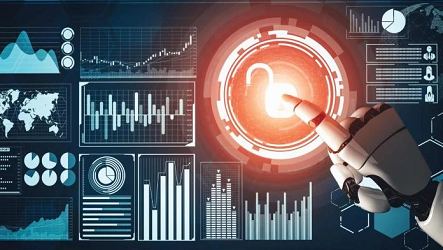Maximizing Workplace Efficiency with Automation and Intelligent Analytic: A 100% Impact Breakdown

1. AI and ML are Transforming HR (30%)
AI and ML are revolutionizing HR management through automation, predictive analytics, and enhanced employee engagement. According to a Deloitte report, 41% of HR professionals currently utilize AI in their processes, while another 31% plan to adopt AI technologies within the next two years.
2. Automating Repetitive Tasks (20%)
The adoption of AI, such as chatbots and virtual assistants, is increasing in HR. These tools handle tasks like responding to employee queries and conducting interviews, freeing HR professionals to focus on more critical functions. For instance, IBM's Watson is used to efficiently process and address employee needs, reducing turnaround time and improving workforce well-being.
Also Read: HRTech Interview with HR Expert, Natalie E. Norfus, Founder of The Norfus firm
3. Predictive Analytics (15%)
Predictive analytics, powered by machine learning algorithms, enables data-driven decision-making in HR. By analyzing historical data, these systems can identify trends related to turnover rates, predict top performers, and develop personalized training plans. Workday People Analytics, for example, uses ML to provide insights into workforce patterns and potential challenges such as attrition.
4. Enhancing Employee Engagement (15%)
AI and ML tools improve employee engagement by utilizing sentiment analysis to gauge morale through communication and feedback. This allows HR to address issues proactively. Microsoft Workplace Analytics leverages data from daily activities to offer insights into organizational performance and employee well-being.
5. Beyond AI and ML: The Power of Intelligent Analytics (10%)
The future of HR lies not only in AI and ML but also in intelligent analytics, which provide deeper insights into workforce characteristics. Real-time data from tools like SAP SuccessFactors help HR departments make quicker, informed decisions, enabling them to monitor and adjust HR activities effectively.
6. Customization and Personalization (5%)
Intelligent analytics allow HR to customize and personalize employee experiences. Tailored training and professional development initiatives are becoming more common. Platforms like LinkedIn Learning use analytics to recommend relevant courses based on an employee’s career trajectory and completed courses.
7. Diversity and Inclusion (5%)
Intelligent analytics also promote diversity and inclusion in the workplace. They help detect biases in hiring, remuneration, and promotions. For example, Intel uses predictive analytics to track and achieve its diversity goals, resulting in a more diverse workforce.
To know more visit: https://hrtechcube.com/automation-and-intelligent-analytics/
- Art
- Causes
- Crafts
- Dance
- Drinks
- Film
- Fitness
- Food
- Jocuri
- Gardening
- Health
- Home
- Literature
- Music
- Networking
- Alte
- Party
- Religion
- Shopping
- Sports
- Theater
- Wellness




